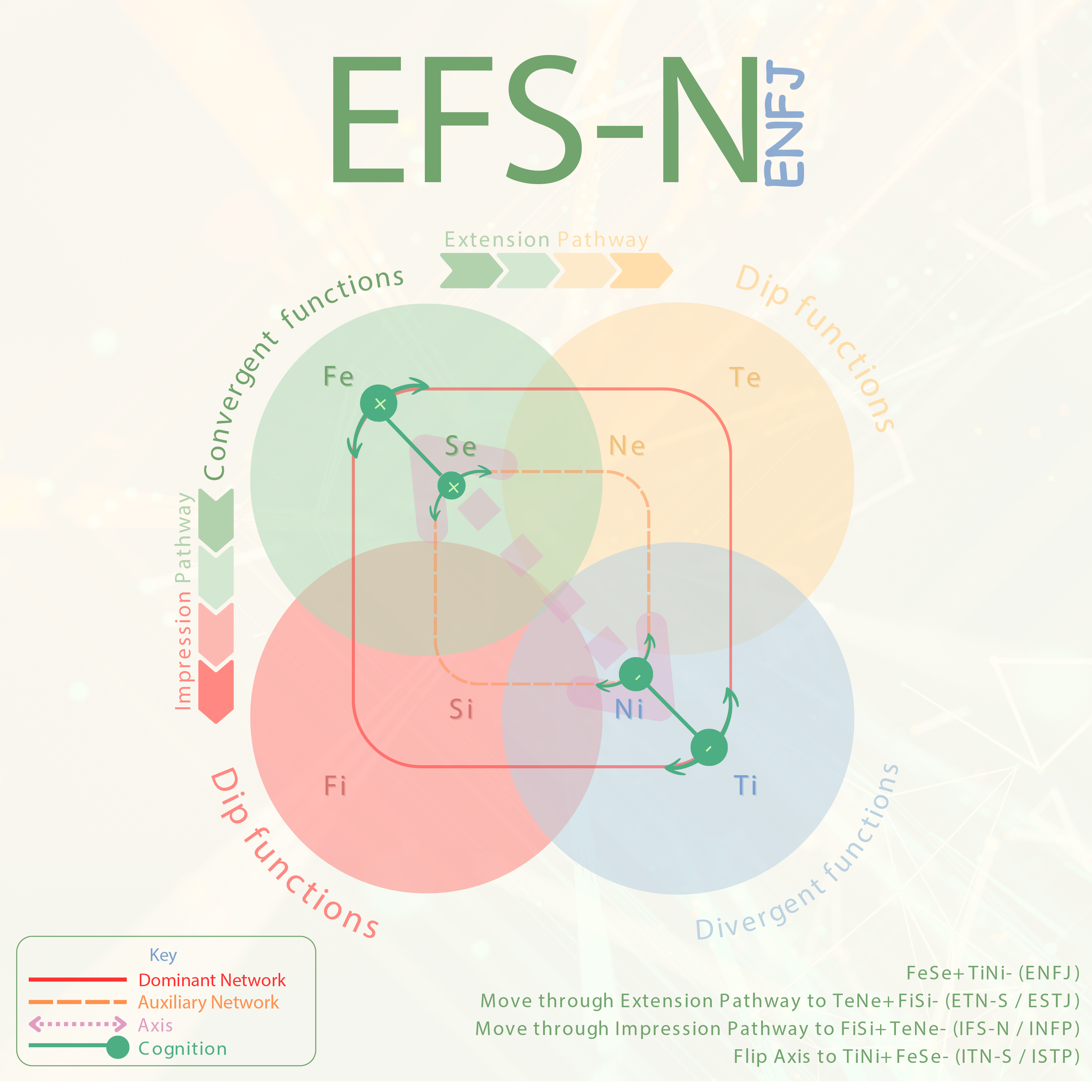
The ENFJ, also known as eFS in Cognitive Personality Theory (CPT), is a dynamic and socially-focused type characterised by their dominant Extraverted Feeling (Fe), agency Extraverted Sensing (Se), authority Introverted Intuition (Ni), and oppositional Introverted Thinking (Ti). This combination makes for someone who realises social potential within the context they are exposed to, whether it be an actual social situation or a sense of social responsibility, driven by a predesignated sense of rightness, correctness, balance, and fairness.
Dominant Position: Extraverted Feeling (Fe)
As the dominant function, Extraverted Feeling (Fe) provides the ENFJ with a focus on external social variables and the emotional states of others. This function excels at creating harmony and fostering deep, authentic connections with those around them.
How it Feels: For the ENFJ, Fe dominance means being constantly aware of the social landscape and how it can be harmonised. They are always seeking to connect with others on a meaningful level, making them highly empathetic and relational in their approach.
Agency Position: Extraverted Sensing (Se)
In the agency position, Extraverted Sensing (Se) provides the ENFJ with the raw intensity and presence of character to make a significant impact. Se is fast-switching and enables them to take decisive action, ensuring they are always ready to seize opportunities to enhance social harmony.
How it Feels: With Se as their agency function, ENFJs can effectively engage with their environment, taking bold and immediate action. They invest their ego in their ability to influence and synchronise with their surroundings, making them dynamic and assertive in their social pursuits.
Authority Position: Introverted Intuition (Ni)
Introverted Intuition (Ni) in the authority position acts as a guiding vision for the ENFJ, ensuring they remain accountable to their long-term goals. Ni provides a sense of direction and purpose, helping them to stay focused on their ultimate objectives.
How it Feels: Ni in this position can feel like an internal compass, constantly pointing the ENFJ towards their grand vision of social harmony. This function helps them maintain a clear sense of purpose and ensures that their actions are aligned with their long-term goals, even if it means making difficult decisions along the way.
Oppositional Position: Introverted Thinking (Ti)
In the oppositional position, Introverted Thinking (Ti) serves as a delicate yet essential function. Ti provides the ENFJ with a sense of internal logic and coherence, ensuring their actions are aligned with their inner values and principles. However, it can also be a source of tension as it generates models and insights that must be realised but not always questioned.
How it Feels: Ti in the oppositional position often feels like a subtle, yet powerful circuit broad driving the ENFJ’s actions. While it can be a source of internal conflict due to its sensitivity and can be rigid in the moment, it also provides valuable insights and rehearsed banks of knowledge that can be swiftly and effectively communicated to others. This function encourages them to stay true to a deep sense of logical integrity, even as they navigate complex social landscapes.
Cognitive Dynamics and Dip Functions
The ENFJ’s cognitive dynamics are characterised by their ability to leverage external social variables and take decisive action through Fe-Se. This type excels at realising social potential within their environment, ensuring their goals are achieved efficiently and effectively.
Dips:
FeSe - TeNe: Engaging systematic and logistical thought processes to ensure interpersonal harmony and organise others. This dip allows the ENFJ to use their dynamic presence and organisational skills to build strong relationships and alliances.
FeSe - FiSi: Baking important social variables and in doing so continuing to adapt the self across situations. This dip helps the ENFJ develop a robust understanding of key social factors that drive success, allowing them to navigate different contexts with ease.
TiNi - FiSi: Applying models of reality and mental health to the self in order to step closer to a social ideal. This dip helps the ENFJ gain a deeper understanding of their internal motivations and how they align with their broader goals.
Conclusion
The ENFJ (eFS) is a naturally conscientious type who often wants to do right by others and live up to their expectations as well as their own powerful sense of self-determination. Their dominant Extraverted Feeling (Fe) drives them to harmonise external social variables and take strategic action, while their agency Extraverted Sensing (Se) ensures they remain dynamic and assertive. The authority Introverted Intuition (Ni) provides a guiding vision, and the oppositional Introverted Thinking (Ti) ensures they remain true to their inner values. Together, these functions create a personality that excels at realising social potential and achieving ambitious goals, making them highly effective and dynamic role models in society.